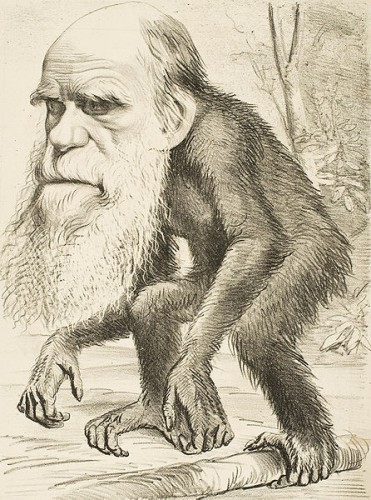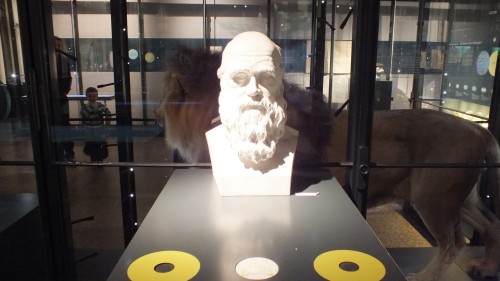From the introduction to the Hebrew edition of Charles Darwin's book The Origin of Species by Saul Adler. The book was published in the early sixties and was reprinted again in the late nineties by Mossad Bialik. The book was submitted to the site review by the publisher

In terms of its scientific importance, the book can be compared to Newton's Principia, and if we come to discuss this book according to the end of its action, according to its blessed and constant influence both on the followers of his ideas and on their opponents, then there is no doubt that it is the most important book published in the nineteenth century, this is the century of thinkers Great opinions and writers. There was no book like it, which provoked thought and research and whose value exists for generations. Darwin himself knew well the value of his book and believed that its action would not be limited to the boundaries of biology, but would have important consequences in psychology, ethics and metaphysics as well.
This book has an interesting history of its own, which I will briefly describe. Darwin was born in Shrewsbury ('' Shrewsbury) in England in 1809. When he was eight years old, his mother died, and so he was sent to the boarding school of a high school. He did not excel in his studies and was considered a less than average student.
It is doubtful if Darwin would have been admitted to university these days based on his academic achievements at school. Apparently he would waste his time looking for butterflies and beetles instead of studying the Roman and Greek languages. When Darwin reached the age of sixteen, his father took him out of school and sent him to Edinburgh to study medicine. The medical classes bored him, and he spent his time collecting biological material and looking at nature in the company of young naturalists. Among other things, he met with Dar Grant, a young zoologist who held Lamarck's theory of development and speaks in praise of it.
It was clear that Darwin did not intend to practice medicine, especially after his father had become rich and had it in his hand to ensure the future of his sons that they would not have to worry about their livelihood.
Darwin the father decided that his son should learn a profession, which would occupy him for the rest of his life, and since the son refused to study medicine or law, he was sent to Cambridge in order to prepare himself to become a priest in the Anglican Church, which Darwin accepted without objection, because in those days he was still intact in his faith. Darwin studied at Cambridge from 1828 to 1831. He studied hard enough to pass the exams, but his main interest was in biology, which was not one of the most respected subjects in the academic world in those days.
In Cambridge we approached Professor Henslow, a priest who was a professor of botany at the university. Henslow got Darwin interested in geology as well and introduced him to Sedgwick, who was a professor of geology there, and this brought the young student closer to the way research was used in the field. This study brought a blessing to Darwin during all his years of research. In 1831, Darwin finished his studies at Cambridge without honors and returned home.

On the recommendation of Professor Henslow, a naturalist was appointed on the ship "Beagle", which went on a mission of the British Navy on a tour around the world. The ship left on December 27, 1831, and returned to England on October 1836, XNUMX. During the voyage, Darwin would get off the ship and conduct tours of the southern coast of America, inland and islands, to collect geological, botanical, zoological, and paleontological material, and by the way, he would buy him news Ecologies on flora and fauna. He was especially impressed by aspects of similarity and difference in the life of our time and in the fossils of the ancient fauna, which he found in the south of America, as well as by the great differences between groups of animals and plants on both sides of the Andes mountains, even though the climate and latitudes and longitudes were equal in both . And greater than that was the impression made on him by the fauna of the Galapagos Islands, an archipelago located eight hundred to a thousand kilometers west of the coast of South America.
To his great astonishment, he found small and constant differences between the turtles on different islands, and noticeable differences between the pharisees on the different islands which are very close to each other, and at the same time they were similar to their kind in South America. His discoveries during his tour on the ship "Beagle" served him as material for thought and research for the rest of his life and laid the foundation for my theory. When he returned to England, he turned to the abundant material, which he had collected in his travels, and the ecological findings that he came across. Before his journey on the Beagle he accepted without question the opinion held by the majority of naturalists at the time, which is that every species in the animal and plant kingdoms is permanently fixed and has not changed since the days of Genesis.
His multiple observations during his tours shook this belief. Since he was free from livelihood concerns, he decided to devote his life to the study of the species problem and started making lists in this regard. In addition to the large amount of material he had, he reviewed all the literature he could obtain that dealt with this problem.
The theory of evolution is important for social life corrected according to the rules of moral theory

The theory of development helps the demand for a reformed social life according to the rules of the moral theory no less than it helps the need for the completeness of agricultural and industrial instruments, and whoever increases in both of these is excellent. Moreover, we must emphasize and say that this disruption was not to Darwin's spirit and heart, he would have been stricter with the demands of morality in all matters of the individual and the general, and he also demanded that the educational institutions should be aimed at this purpose. And it is pleasant and worthy to mention that he himself was a great man of character, noble-spirited and clean of all faults.
In the autobiography he wrote for his children at the end of his life, he says that he does not regret dedicating all his days to science; The other choice, which attracted his heart, was to devote all his days, and not some of them, to the service of humanity. It is clear to our contemporaries that he did humanity a great favor in this, that he devoted his entire life to science.
What did the 'Origin of the Species' win? First of all, that Darwin based his theory on a multitude of facts, coming from the animal and plant world in the present and in the distant past. Fact after fact, the mind embraces the wealth of material that Darwin presents to the reader, and one is not drowsy from his conclusions. Second, the material is very diverse; Anatomical structure and instincts, geographic distribution, fertilization, breeding hybrids, evidence from geology, evidence from domesticated plants and animals, and much more. There is much here to enrich the mind and feed the imagination; After all, against a vast background of time and space, Darwin painted the picture of the development of the fauna and flora on the earth, the earth was formed, continents and seas were formed. Islands emerged in the heart of seas, ages passed, layers and geological formations settled down and buried in them faithful witnesses to the fact that the flora and fauna of those distant days was different from what exists today.
From time to time the land areas sank and were covered by water, and in the course of time they returned and rose and became a land filled with new life and new vegetation. The ice ages came, and the animals migrated and the flora dispersed from the polar regions towards the equator, and when the climate returned and became more favorable, their descendants returned and ascended north and south to the land of their first ancestors, but some of them remained stuck on the tops of the mountains; The current-swept icebergs wandered in the heart of the seas and unloaded their cargo on deserted islands. Real facts and real evidence on every page; There is no mobilization of fictitious forces here, such as the need of animals to move forward, and no compilation of mysterious forces that human logic cannot grasp to prove and analyze; And of course you thank him, that the animals have changed and eighty new ones, which are the descendants of species that preceded them, have become over time.
Ever since Darwin wrote the 'Origin of Species', our knowledge of the theory of evolution has multiplied, new branches of biology have even been born, and yet the value of 'Origin of Species' remains, and the reader and perusal of it seems to have become an eyewitness to one of the decisive events in the history of science and thought.
More of the topic in Hayadan:
- Darwin's Origin of Species - a biography of a book. From a marine adventure to a scientific revolution
- Darwin's Origin of Species - a biography of a book, the third and last part of the first chapter
- Evolution: Why does it seem to have a direction and how will it evolve?
- A brief history of Darwin's trip to the Galapagos Islands: the moment he reached the initial insights about evolution
